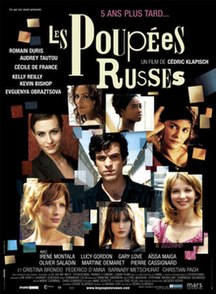
Sergei Pavlovich Diaghilev, usually referred to outside Russia as Serge Diaghilev, was a Russian art critic, patron, ballet impresario and founder of the Ballets Russes, from which many famous dancers and choreographers would arise.
Russians are an East Slavic ethnic group and nation native to European Russia and other parts of Eastern Europe ; they are the most numerous ethnic group in Europe. Until the 1930s the nationality was officially known as Great Russians. The majority of ethnic Russians live in the Russian Federation, but notable minorities exist in other former Soviet states such as Belarus, Kazakhstan, Moldova, Ukraine and the Baltic states. A large Russian diaspora has developed all over the world, with notable numbers in the United States, Germany, Brazil, and Canada. The culture of the ethnic Russian people has a long tradition and it is a foundation for the modern culture of the whole of Russia. The Russian language originally was the language of ethnic Russians. They are historically Orthodox Christians by religion.

Michael Fokine was a groundbreaking Russian choreographer and dancer.

Leonid Fyodorovich Myasin, better known in the West by the French transliteration as Léonide Massine, was a Russian choreographer and ballet dancer. Massine created the world's first symphonic ballet, Les Présages, and many others in the same vein. Besides his "symphonic ballets," Massine choreographed many other popular works during his long career, some of which were serious and dramatic, and others lighthearted and romantic. He created some of his most famous roles in his own comic works, among them the Can-Can Dancer in La Boutique fantasque (1919), the Hussar in Le Beau Danube (1924), and, perhaps best known of all, the Peruvian in Gaîté Parisienne (1938). Today his oeuvre is represented by his son Theodor Massine.

Russian ballet is a form of ballet characteristic of or originating from Russia.

Dr Mark Ridley was an English physician and lexicographer, born in Stretham, Cambridgeshire, to Lancelot Ridley. He became physician to the English merchants in Russia, and then personal physician to the Tsar of Russia.

Russian Dolls is a 2005 French-British comedy-drama film, the sequel to L'Auberge Espagnole (2002) and the second part of the Spanish Apartment trilogy, which is concluded with Chinese Puzzle. Cédric Klapisch wrote and directed the film, whose settings include Paris, London, Saint Petersburg and Moscow. Klapisch makes use of digital and split-screen effects in the film, as well as non-linear narrative.

A charlotte is a type of dessert or trifle that can be served hot or cold. It is also referred to as an "icebox cake". Bread, sponge cake or biscuits/cookies are used to line a mold, which is then filled with a fruit puree or custard. It can also be made using layers of breadcrumbs.

The Ballets Russes was an itinerant ballet company based in Paris that performed between 1909 and 1929 throughout Europe and on tours to North and South America. The company never performed in Russia, where the Revolution disrupted society. After its initial Paris season, the company had no formal ties there.

Ismail Gaspirali was a Crimean Tatar intellectual, educator, publisher and Pan-Turkist politician who inspired the Jadidist movement in Central Asia. He was one of the first Muslim intellectuals in the Russian Empire, who realized the need for education and cultural reform and modernization of the Turkic and Islamic communities. His last name comes from the town of Gaspra in Crimea.

Russian Mountains were a predecessor to the roller coaster.

Irina Mikhailovna Baronova FRAD was a Russian ballerina and actress who was one of the Baby Ballerinas of the Ballet Russe de Monte Carlo, discovered by George Balanchine in Paris in the 1930s. She created roles in Léonide Massine's Le Beau Danube (1924), Jeux d'enfants (1932), and Les Présages (1933); and in Bronislava Nijinska's Les Cent Baisers (1935).
The Baraba Tatars are a sub-group of Siberian Tatars and the indigenous people of the Ob-Irtysh interfluve. After a strenuous resistance to Russian conquest and much suffering at a later period from Kyrgyz and Kalmyk raids, they now live by agriculture — either in separate villages or along with Russians. Some of them still speak Baraba dialect of Siberian Tatar language. They traditionally live on the Baraba steppe.
Le beau Monde, opus 199, is a quadrille composed by Johann Strauss II, written in 1857, while Strauss was conducting a tour of Russia with his orchestra. The work exudes the authentic musical flavour of Russia, and the St. Petersburg edition of the work describes the composition as a Quadrille sur des airs Russes. The title of the quadrille reflects the fashion then in Russia for the French language.

Alexander Tikhonovich Pushnin was a Soviet, Russian painter, Doctor of Art-criticism, professor of the Repin Institute of Arts, lived and worked in Leningrad, member of the Leningrad Union of Artists, regarded as one of the representatives of the Leningrad school of painting, most famous for his portrait and historical painting.
Ariane, jeune fille russe is a 1931 French-German drama film directed by Paul Czinner and starring Gaby Morlay, Rachel Devirys and Maria Fromet. It was a French-language version of the film Ariane made a co-production. It was adapted from the 1920 novel Ariane, jeune fille russe by Claude Anet.
Ariane, jeune fille russe is a 1920 novel by the French tennis player and writer Jean Schopfer, published under the pseudonym Claude Anet. It follows a young Russian woman who encounters a Don Juan and falls in love with him.
The year 1991 was marked by many events that left an imprint on the history of Soviet and Russian Fine Arts.
Russians are a small diaspora in France but one of the most important groups in the Russian diaspora.











